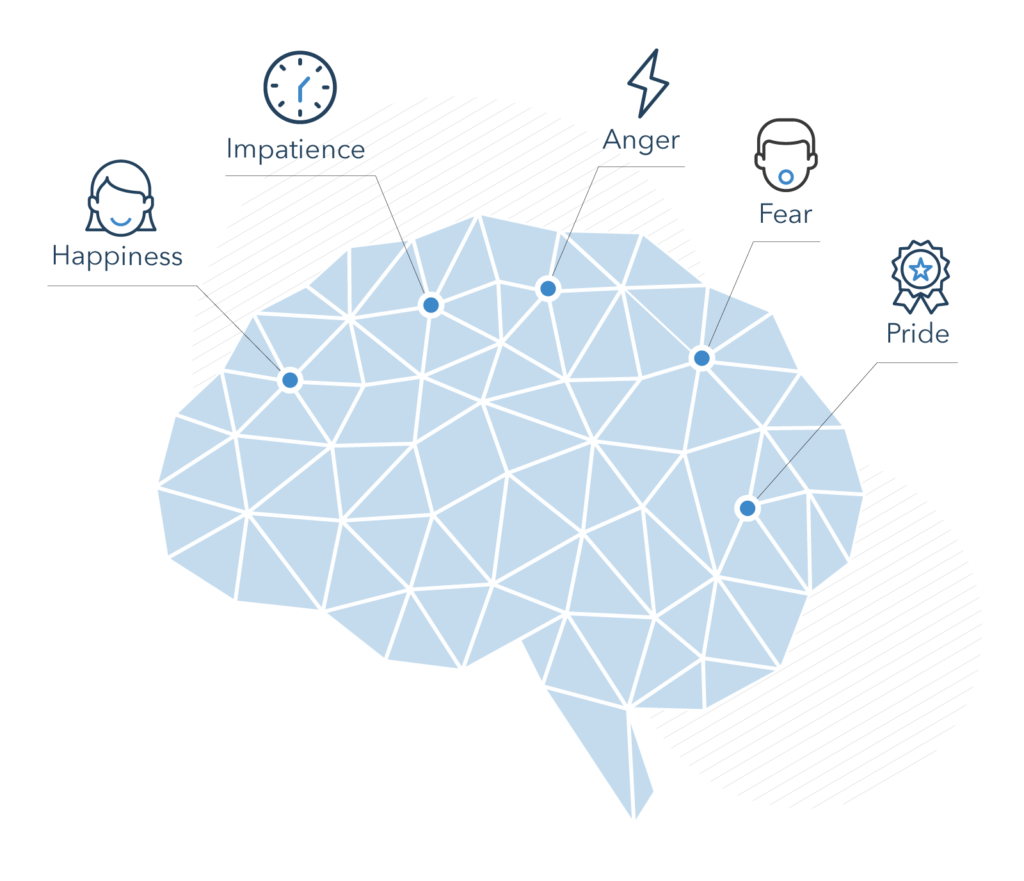
Being a good trader depends on a variety of elements, one of which is maintaining the proper mindset. Learn how to enhance your trading psychology to lessen the impact of emotions and biases when you are trading.
What is Trading Psychology?
The term “trading psychology” describes a trader’s frame of mind while they are actively trading. It might decide how much of a profit they are able to secure or it can explain why a trader suffered significant losses.
In trading psychology, innate human traits like biases and emotions are crucial. The major goal of studying trade psychology is to increase one’s awareness of the different dangers linked to bad psychological traits and to cultivate more positive traits. Trading psychology experts typically do not operate out of bias or emotion. Therefore, they have a better possibility of making money while trading or, at the very least, of limiting their losses.
Trading psychology is different for every trader, as it is influenced by each individual’s own emotions and pre-determined biases. Some of the emotions which impact trading are:
- Happiness
- Impatience
- Anger
- Fear
- Pride

How to improve your Trading Psychology
Knowing your own emotions, prejudices, and personality factors will make it easier for you to improve your trading psychology. Once you are aware of these, you may create a trading strategy that takes them into consideration in an effort to lessen their potential impact on your choice-making.
For instance, if you naturally possess confidence, you can discover that overconfidence and pride impair your ability to make decisions. For instance, instead of taking a slight loss on your trading account, you can choose to let losses accumulate in the hopes that the market will turn around. Greater losses or the eventual demise of your trading account could result from this.
Stops are a means to limit your losses and decide when to close a particular trade before you initiate the position, which can be used to counteract this. By doing this, you have become mindful of your own prejudices and emotions because you have chosen to take action against them rather than acting on them.
How does Bias affect Trading?
Biases have an impact on trade since they are, by definition, a decidedly biased preference for one product over another. They may therefore impair your judgement and drive you to act on instinct rather than logical fundamental or technical analysis, which can make your decision-making difficult when you are trading.
This is because trading bias means that you could be more likely to trade an asset that you have had past success on, or to avoid an asset on which you have incurred a historic loss. It is important that traders are aware of their conscious biases as this can help them overcome them and approach the markets with a more rational and calculated mindset.
There are five main types of bias:
- Representative bias means that you will stick to or be more inclined to replicate previously successful trades. You might do this without carrying out analysis for every trade of this type because in the past, it has paid off for you. However, even if two trades seem similar, it is important to approach every trade on its own merits rather than on historical success
- Negativity bias makes you more inclined to only look at the negative side of a trade, rather than acknowledging what went right. This could mean that you scrap an entire strategy when, in fact, you might only have needed to tweak it slightly to turn a profit
- Status quo bias means that you will continue to use old strategies or trades rather than exploring new ones – you will stick to the status quo. The danger arises when you fail to assess whether those old methods are still viable in the current market
- Confirmation bias is when you seek out, or give greater weight to, news and analysis that confirms your pre-formulated ideas. It may also be that you don’t seek out, or disregard, information which disproves your convictions
- Gambler’s fallacy is where you assume that because an asset has been increasing, it will continue to rise. There is no reason to believe that it should, similar to how there is no reason that a coin should land tails side up – rather than heads – after doing so a few times in a row.
- 7 tips to avoid emotional trading
- Identify your personality traits
- Develop and follow a trading plan
- Have patience
- Be adaptive
- Take a break after a loss
- Accept your winnings
- Keep a trading log
1 Identify your personality traits
The ability to recognize your personality traits early on is one of the keys to establishing good trading psychology. You must be completely honest with yourself and acknowledge any impulsive inclinations or a propensity for irrational behavior’s.
If this is the case, it is critical to keep these characteristics in check when you are actively trading as they may drive you to make snap judgements that lack sufficient analytical support. However, it’s also crucial to utilize your unique strengths.
Recognizing your biases, as described above, is just as crucial as recognizing your personality traits and emotions. Although biases are a natural part of human nature, you should be conscious of them before entering or exiting any deals.
2 Develop and follow a trading plan
A trading strategy is essential to helping you reach your objectives. The blueprint for your trading, a trading plan should include your time commitments, available trading capital, risk-to-reward ratio, and a trading method you are at ease with.
For instance, a trading plan might specify that you’ll dedicate an hour to trading every morning and evening and that you won’t risk more than 2% of your portfolio’s entire worth on any one trade. As the guidelines for entering or closing a trade are already stated for you, this can help you minimize losses and limit the impact of emotions on your trading.
Trading plans should also take into account individual factors that could affect your trading discipline such as your emotions, biases and personality traits. If you make clear what your biases are before you start trading, you might be less inclined to act on them.
3 Have patience
It is essential that you have patience with your positions because patience is a fundamental component of discipline. When you make decisions based on emotions like fear, you run the risk of closing a position too soon and losing money. Have faith in your analysis, and practice patience and self-control. Similarly, it is crucial to exercise patience when trying to enter a trade and to do so at the correct time rather than immediately.
For instance, you could want to wait until right before a Bank of England (BoE) announcement if you wanted to speculate on particular GBP currency pairs like EUR/GBP or GBP/USD because there is typically more volatility at this time.
4 Be adaptive
While it is important to have a trading plan, remember that no two days on the markets are the same, and winning streaks don’t exist in trading. With this in mind, you should become comfortable in assessing how the markets are different from day to day and adapt accordingly.
If there is more volatility on one day compared to the day before and the markets are moving particularly unpredictably, you may decide to put your trading activity on hold until you’re sure you understand what is happening. Being adaptive can help to limit your emotions and rule out representative and status quo biases, enabling you to assess each situation on its own merits – ensuring that you are pragmatic during your time on the markets.
5 Take a break after a loss
Sometimes, rather than immediately entering another trade in an effort to make up some of your losses, it is preferable to take a brief break from your trading account to collect your thoughts and compose yourself.
The most successful traders are those that accept losses and use them as teaching experiences. Before returning to their platform, they usually take a few minutes to themselves. During this time, they evaluate what went wrong with that specific trade in the hopes of learning from it so they won’t make the same mistake again.
6 Accept your winnings
Quitting when you’re ahead and taking your winnings is just as crucial as taking a break after a setback. You might feel invincible after a run of victories or one particularly sizable victory, at which point you might move into another position and try to repeat the process.
Since today is “your day” on the markets, you can even initiate a string of fresh positions in the hope that none of them would lose money. Due to this, you can end up taking unwarranted risks or diversifying your portfolio too quickly without first researching each market.
7 Keep a trading log
You can keep track of all your wins and losses, as well as the feelings you had during each trade, by keeping a trading journal. As a result, it represents the conclusion of all the earlier ideas discussed in this essay. You can use it to determine whether or not the decisions you made at any given time were wise ones.
A trading journal can be used, for example, to note the moment you decided to reduce your losses and the final price the asset reached. You can determine if you made the proper choice or not by doing this.
Trading psychology summed up
- Trading psychology is all about your mindset during your time on the markets and it can inform an explanation of your profits or losses
- It is important for you to be aware of your own weaknesses and biases before entering a position but, equally, it is important that you understand your own strengths
- Learn from your wins as much as your losses, but remember that winning streaks don’t exist in trading and that each position should be assessed on its own merits
- Knowing when to take a profit or cut a loss can be the difference between a good day and a bad day on the markets
- Keep a trading log as a record for you to see what worked, what didn’t work, and whether your decision at the time was correct in hindsight. Use this information to improve your decision making in the future.
Disclaimer : The information mentioned above is merely an opinion and should only be treated for educational purposes. If you have any questions or feedback about this article, you can write us back. To reach out, you can use our contact us page
